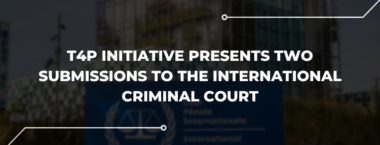
Torments, Torture Chambers, Executions: T4P Initiative Presents Two Submissions to the International Criminal Court
Information about extrajudicial executions of Ukrainians by the Russian military and Russian torture chambers in...
28 September 2023
12.09.2018
On September 11, 2018, in the framework of the OSCE Human Dimension Implementation Meeting international conference in Warsaw, UHHRU held a side event dedicated to the armed conflict in Ukraine and transitional justice
The OSCE Human Dimension international conference is an annual forum for discussing urgent problems of Europe in the field of human rights protection, bringing together representatives of OSCE states and world media. It is now extremely important for Ukraine to tell the international community about the gross violations of human rights continuing in non-government-controlled areas. Thus, using this conference as a platform for attracting our European partners’ attention is an important component of counteracting Russian propaganda and aggression.
The event was entitled “Search for Truth and Prosecution: War Crimes and Human Rights Violations in the East of Ukraine”. Among the speakers were Oleksiy Bida, UHHRU Documentation Center coordinator; Vitaliya Lebid, UHHRU Strategic Litigation Center lawyer; Yuliya Erner, project coordinator at the German organization DRA (German-Russian Exchange), 1 Oleksandr Cherkasov, member of the Board of the Russian NGO Memorial 2, Valeriy Novikov, head of the Board of Luhansk Human Rights Center “Alternative” 3.
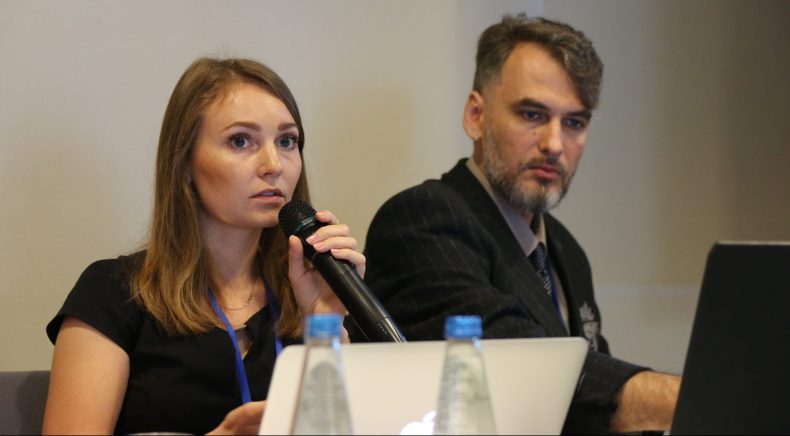
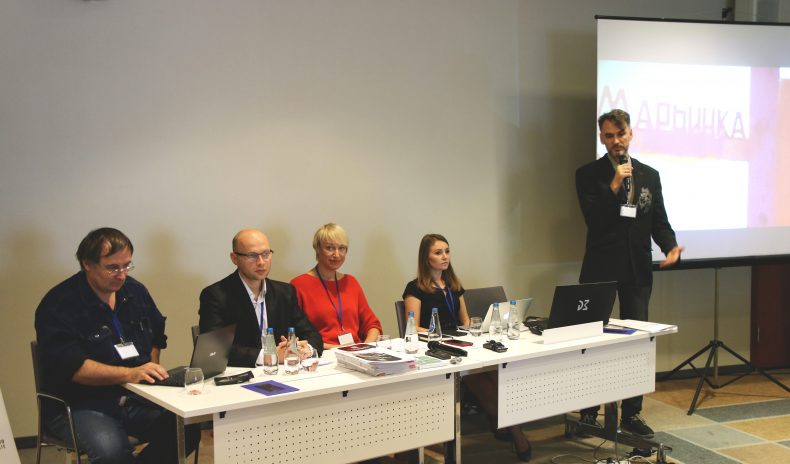
Shown at the beginning of the event was a film about the events in Mariinka, which became embroiled in battles with pro-Russian armed groups. The film illustrates the report “Mariinka: In the Firing Line”, which is one of a series of reports on frontline Ukrainian cities, which was also made public during the event. These materials describe the tragic story of one of Ukrainian cities and its residents during the armed conflict. Mariinka, once a quiet and peaceful city, had been turned into a theater of large-scale and unrelenting military operations.
Follow this link to see the report “Mariinka: In the Firing Line”
Because of its strategic location, the city was the next target of pro-Russian illegal armed groups after Donetsk. For a long time, Mariinka had been in the so-called “gray zone”. As a result of numerous artillery attacks, the city was turned into a ruin, with damaged buildings, power lines, factories, city administration and post offices as well as destroyed museum. Today, the city is divided in two zones: normal and red. In spite of all peace talks and agreements, the city still remains one of the hottest frontline spots, and war has become a commonplace sight there.
Oleksiy Bida, one of the report’s authors, noted during his speech that the search for truth constitutes an important component of transitional justice. “Ukraine and Russia are not only in a state of armed conflict but, first of all, in that of information warfare. In their studies, human rights defenders are confronted with evidence of hypocritical hide and seek games played by Russian armed forces. The military, forgetting honor and rules of war, are violating the Geneva Conventions: we have collected information about murders and torture of not just prisoners of war, but of civilian population as well, about people living in the occupied territories being persecuted for political reasons, and regarding other crimes against humanity.”
Vitaliya Lebid emphasized that UHHRU’s main objectives include finding justice for the victims of the conflict, bringing those responsible for crimes against humanity and war crimes to account, and proving Russia’s involvement in the conflict. In her speech, Vitaliya mentioned difficulties with investigating the crimes reported by victims at the national level. She stated, in particular, that when the victims turn to Russia’s law enforcement, they are denied investigation, since Russia does not recognize its involvement in the events in Ukraine’s east. As for investigations in Ukraine, national police is also ineffective. Investigations are further complicated due to the lack of access to the crime scenes, which does not, however, free Ukraine from its commitments, nor does it dismiss the fact that a wide range of investigative actions is still available that can help identify the perpetrators and, for instance, put them on an international wanted list. The Military Prosecutor’s Office has been more successful in this regard, bringing charges against certain representatives of the self-proclaimed republics and Russian military. However, there is still the issue of getting to the suspects and arresting them. Moreover, given the reform of the law enforcement system, these cases are expected to be transferred to the State Bureau of Investigations, and it remains to be seen how this change is going to affect the whole process.
Summing up, Ukrainians essentially have no effective remedies at the national level, which forces them to seek justice at the international level. However, according to the lawyer, turning to international courts also has its challenges. “There are risks due to how much time it takes for the International Criminal Court to examine a case. Recently, assassinations of a number of terrorists and DPR leaders have been reported, such as “Givi”, “Batman”, “Motorola” and Oleksandr Zakharchenko. So it is unclear whether anyone will still be around to be prosecuted for crimes against humanity in a few years. Thus, it is very important to expedite the proceedings at the International Criminal Court.”
The event also featured the presentation of the CivilM+ platform that united Ukrainian, Russian and European NGOs for systematizing human rights violations in eastern Ukraine. They work in various areas – human rights , peacemaking, and humanitarian efforts – for the purpose of achieving a peaceful resolution of the conflict in Donbas and mitigating its effects. UHHRU is also involved in the work of this association.
According to Valeriy Novikov, within the framework of the CivilM+ platform, its members get the opportunity to work together, creating and implementing joint initiatives and projects, developing and expressing their common views, providing mutual support and solidarity, systematizing knowledge, ensuring professional development and better coordination of conflict-related activities in Donbas.
Quoting Oleksandr Cherkasov, “while investigating the conflict in Donbas, we encounter the same people who had been involved in war crimes during other conflicts in post-Soviet countries. They evade prosecution and even get promotions. This chain of crimes must be broken to secure peace in the future.”
All in all, the event managed to capture the attention of the audience. After speakers’ speeches, a Q&A session took place, with particular interest expressed in the events in Mariinka and the report’s methodology, as well as the challenges faced by Ukrainian human rights defenders working with conflict-related issues, and the formats of cooperation with Russian human rights organizations.
UHHRU’s participation in the event was made possible due to the support of the American people provided through USAID. The American people, through USAID, have provided economic and humanitarian assistance worldwide for 55 years. In Ukraine, USAID’s assistance focuses on three areas: Health and Social Sectors, Economic Growth, and Democracy and Governance. Since 1992, USAID has provided technical and humanitarian assistance to Ukraine amounting to $1.8 billion.
For additional information about USAID programs in Ukraine, please visit the USAID website at http://ukraine.usaid.gov or Facebook page at https://www.facebook.com/USAIDUkraine.
If you find an error on our site, please select the incorrect text and press ctrl-enter.

Information about extrajudicial executions of Ukrainians by the Russian military and Russian torture chambers in...
28 September 2023
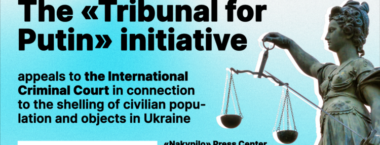
Since the onset of the full-scale invasion, the «Tribunal for Putin» initiative has recorded about...
18 August 2023
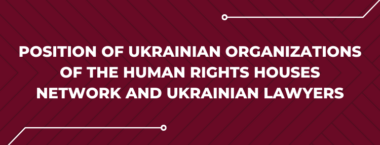
Position of Ukrainian organizations of the Human Rights Houses Network and Ukrainian lawyers on the...
17 July 2023

On June 6, 2023, the Southern Area Military Court of Rostov-na-Donu sentenced Mr.Bohdan Ziza, a...
08 June 2023